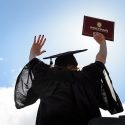Surgeon returns after five decades to complete elusive bachelor’s degree
Consider the four-year plan, the five-year plan and the not-to-be-forgotten six-year pace to the bachelor’s degree, and then get a look at Richard Smith’s transcripts.
“I’m on the 50-year plan. Nothing wrong with that,” says Smith, 66, who is set to earn his bachelor’s degree in 2010 after first enrolling at the University of Wisconsin–Madison in 1960 — and after a 40-year career as a distinguished oral surgeon and more than three decades as a professor at the University of California-San Francisco.
That’s right. He’s a DDS with no BS.
After three years at UW–Madison, the Brooklyn native applied to dental school at Columbia University, and was accepted. It was an invitation once (but no longer) extended to two or three degreeless undergrads every year, according to Smith.
“You say, ‘Gee, how could I pass this up?'” he says. “What if they don’t take me next year?”
But it never sat right with him that he skipped out on Madison.
“I always felt there was a void there, an incompleteness in my education.
I always said I could always come back and do this.”
After his 1967 graduation from dental school the Air Force intervened. After the service, academia came calling.
“And we didn’t have the Internet,” Smith says. “This couldn’t be done remotely. You had to physically be there, and that wasn’t really an option.”
After transitioning to emeritus status at the university in 2003 and wrapping up his years in practice in 2005, free time caught up to technology. He poked around the UW–Madison Web site, had some discussions with faculty and settled on finishing a degree in history and history of science — an area of particular interest.
“They had lots of meetings on me, and I spoke with a dean about the requirements for a degree in the Letters & Science,” Smith says.
When a combination of requirements for general education from the ’60s and the modern history of science major was struck, Smith put his nose back to the undergrad grindstone.
“Let me tell you,” Smith says, “I forgot how much work it is in undergraduate school.”
And that’s without what he called “all the distractions” of his first go-round.
“Let’s see … beer parties on Fridays, dates on Saturdays, library dates — not much studying there — the pub on State Street, the carrying on in the dorms,” Smith says. “You could say I have a different focus, though.”
And better digs. With a housing crunch on campus in 1960, his first dorm room was a converted ironing closet on a bunk bed shared with a roommate who was 6-foot-7.
“They said after the six-weeks exams there would be an exodus, and they were right,” Smith says. “I got a much better room after that.”
Of course, he left, eventually, but he is back on campus for a semester ritual that includes attending each class he’s taking (usually three credits at a time, and over the Internet) in person.
“When you give a cold call or e-mail to somebody, they don’t know who you are. You’re a virtual person,” Smith says. “I want to meet people and reassure them that this undertaking will not be a disaster; they can count on me.”
And they can count on some strange coincidences — such as when Smith turned up on an undergraduate course roster with David McDonald, the Alice D. Mortenson-Michael B. Petrovich Professor of Russia History, decades after answering to a class roll read by the Michael B. Petrovich.
Smith plans on walking across a stage in 2010, picking up a diploma now 50 years in the making.
“It will probably be within a few days of my son getting his graduate degree,” Smith says. “We can celebrate that together.”

